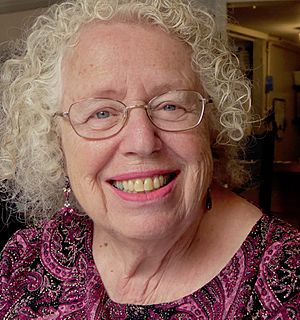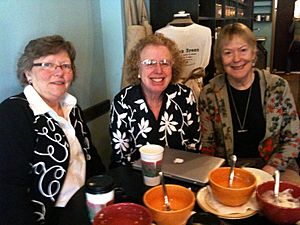Joan Straumanis facts for kids
Quick facts for kids
Joan Straumanis
|
|
|---|---|

Straumanis in 2017
|
|
| 4th President of Metropolitan College of New York | |
| In office 2007–2008 |
|
| Preceded by | Stephen A. Greenwald |
| Succeeded by | Vinton Thompson |
| 20th President of Antioch College | |
| In office 2002–2004 |
|
| Preceded by | Robert Devine |
| Succeeded by | Steven Lawry |
| Personal details | |
| Born |
Joan Elaine Cole
February 10, 1937 New York City, US |
| Other names | Joan Pomerantz |
| Alma mater | Antioch College (mathematics, political science), University of Maryland (philosophy) |
Joan Straumanis (born 1937) is an amazing leader in education. She is a philosopher, mathematician, and a strong supporter of women's studies. She helped create one of the first women's studies programs outside of a big public university. She also led two colleges as president: Antioch College and the Metropolitan College of New York. She was also a dean at other schools.
Contents
Early Life and Education
Joan Straumanis was born in New York City. She grew up in a large housing area called Parkchester in the Bronx. Her parents were children of immigrants from Eastern Europe. Her father was the first in his family to go to college. Her mother went to college after working for many years.
Even as a young child, Joan was allowed to explore the city by herself. She would ride the subway and visit museums. This helped her become very independent and interested in many different things.
Joan went to Bronx High School of Science, a special school for smart students, and graduated in 1953. She then attended Antioch College, finishing in 1957. She studied mathematics at the University of Colorado and Ohio State University. Later, she earned her PhD in philosophy from the University of Maryland in 1971.
Career in Education Leadership
Joan Straumanis taught in high schools and colleges. She also worked for the U.S. government, helping to manage grant programs. These programs gave money to support education and science. She worked at the United States Department of Education and the National Science Foundation.
She was a leader at five different colleges in the U.S. She was an academic dean at Kenyon College, Rollins College, and Lehigh University. She became president of Antioch College and the Metropolitan College of New York.
Joan Straumanis was the first woman to hold a senior leadership job at Kenyon College. She was also the first woman to be a full professor there. She was the first female president of Antioch College. She was also the first woman dean at any college within Lehigh University.
Before getting her PhD in philosophy, she taught math to high school students. After her PhD, she taught philosophy at colleges. She taught many subjects, including ethics, logic, women's studies, and the history of science.
Throughout her career, she supported new and creative ideas in education. She served on many boards that helped promote art, science, and education. She also helped review and approve academic programs at different schools.
Leading Colleges Through Change
Antioch College Leadership
Joan Straumanis was the president of Antioch College from 2002 to 2004. During this time, she worked to build trust with the college staff. She helped complete a new contract with the staff union, which was the first time this had happened in 30 years.
She also led a special group called the Renewal Commission. This group worked to improve the college. She helped Antioch College become a founding member of the Eco League. This is a group of "green" colleges that focus on environmental studies. She also started a fundraising campaign and helped improve the college's classes and budget.
Metropolitan College of New York Leadership
In 2007, Joan Straumanis became the president of the Metropolitan College of New York for one year. She stopped plans to sell the college to a for-profit company. She helped the college return to its original goal of combining community service with academics.
She also helped increase student enrollment and rebuilt the college's leadership team. People said her "smart, down-to-earth leadership style brought the college back from the brink." When she started, she said it would be "challenging" and an "adventure."
Kenyon College Innovations
When Joan Straumanis moved to Kenyon College, she brought new ideas as an associate provost. She believed that women's studies should be part of a well-rounded education. Within her first year (1983–1984), she helped create a women's studies class.
She also thought that colleges should use computers more in education. She made sure Kenyon College was a leader in using computers for learning.
Straumanis also helped start other new programs. These included a five-year program for future teachers and a program for talented high school students. She also helped create an International Studies major and a Summer Science Scholars program.
Denison University Challenges
After graduate school, Straumanis was hired as a philosophy professor at Denison University. She was a key leader in starting women's studies there. This was a big change for the university.
In 1975, Denison University did not want to give Straumanis and three other female professors permanent jobs (called tenure). One reason given was her work in women's studies. However, a strong protest from the growing women's movement at Denison made the university change its mind. Straumanis was then granted tenure.
Pioneering Women's Studies
Starting a Program at Denison University
In 1972, Joan Straumanis helped create a women's studies program at Denison University. She worked with Ann Fitzgerald and student Peggy Gifford. This was one of the first women's studies programs at a private college. It started soon after similar programs at UCSD and SUNY Buffalo in 1971.
Denison University later became the first co-ed college to require students to take a Black studies or women's studies course for graduation. In 1981, Denison offered a minor in women's studies, and in 1983, a major.
The program became very popular. In its second semester, 120 students joined, including eleven men. At first, it was hard to get formal credit for women's studies classes. So, they created a special pass/fail class that didn't have grades. This allowed students to lead discussions and explore topics freely.
In 1984, Straumanis talked about what made the program special. She said it focused on "collective leadership." This meant that many people shared leadership roles. New people were always involved in teaching women's studies. She also highlighted the strong connection between women's studies and Black studies.
One interesting assignment for students was to choose a paper from another class. They then had to focus it on a feminist who was important to that topic. This helped both teachers and students learn about important women they might not have known about. It made everyone more open to women's studies.
Eventually, Denison's women's studies classes became regular credit courses. Students pushed for a graduation requirement. This new rule meant every student had to take a class in women's studies or Black studies.
At the end of each semester, the women's studies class would have a party. They would make fun of the idea that their course was "one-sided." Straumanis remembered that they would jokingly teach "the other side" on one day. This showed that they knew other viewpoints existed, but their course focused on what was often missing from education.
Defining Women's Studies
In a 1986 interview, Straumanis explained her view of women's studies. She said it's not just one subject. It's an interdisciplinary study that looks at the whole idea of gender. She said it considers men too, and looks at how gender affects things that have been left out of subjects like psychology, history, and literature. It doesn't just look at what women have done, but how gender makes a difference.
In 1981, Denison University gave Straumanis the first annual Faculty Leadership Award. She also helped start the Great Lakes Colleges Association's Women's Studies Consortium. She also helped create the Society for Women in Philosophy.
Working with Federal Grants
Joan Straumanis worked as a program director at two U.S. government agencies. These agencies helped support higher education. From 1992 to 1995 and again from 1998 to 2002, she worked at the Fund for the Improvement of Postsecondary Education (FIPSE) in the United States Department of Education.
From 2008 to 2010, she worked at the National Science Foundation. There, she managed research projects about how the brain learns. She also helped guide projects that developed learning models for Native American communities.
She also advised the National Academy of Engineering on engineering and technology from 2000 to 2002.
A Guide to Getting Grants
In 1992, she wrote a guide called "Funding Your Best Ideas: A 12 Step Program." This guide became a very helpful resource for people looking for grants. It is still used today by many organizations.
Political Activities
American Civil Liberties Union
Joan Straumanis was a board member for five different local groups of the American Civil Liberties Union. This organization works to protect people's rights and freedoms. She served in Virginia, Pennsylvania, and Florida.
Personal Life
Joan Straumanis has been married twice. She was married to chemist Irwin Pomerantz, and they later divorced. She also married philosopher Eric Straumanis, who has passed away. She has three children and four grandchildren.


